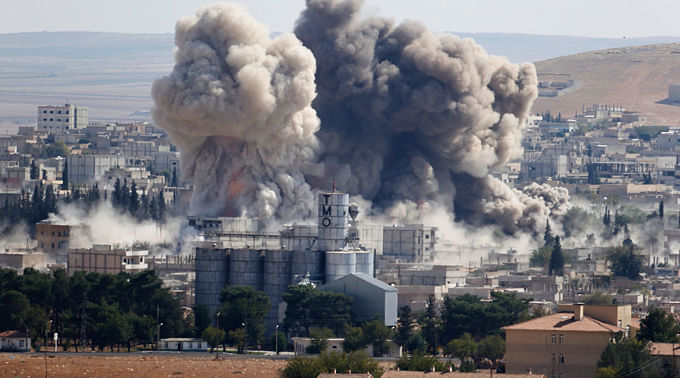US airstrikes against IS have hurt moderate rebels
US airstrikes against IS have hurt moderate rebels

As the US-led airstrikes target Islamic State (IS) strongholds in eastern Syria, reports emerged that Syria’s air force has intensified its airstrikes on rebel positions in the west.
Opponents of the US strikes argue that they have given an indirect boost to Syrian regime forces, helping them focus their attacks on rebel positions outside of IS-held territory.
The strikes have also hit Jabhat al-Nusra positions, which put inter-rebel relations under enormous strain, says Faysal Itani, a fellow at the Atlantic Council. Jabhat al-Nusra, an al-Qaida affiliate, has been one of the sharpest fighting forces against the regime of President Bashar al-Assad. They had won popular support for their successes on the battlefield.
Itani gave Syria Deeply his analysis of the US strikes on IS and how they have shifted dynamics on the ground.
Syria Deeply: In your view, what have the US-led strikes on IS achieved so far? What have they targeted and hit that makes a material difference to the group?
Itani: The main achievements have been hurting their economic infrastructure, forcing them to shift from a high-profile governance mode to a much more subtle, dispersed underground mode, and it’s complicated their attempts to launch large-scale offensives to expand their geographic scope of control. These are not insignificant achievements, but they aren’t game-changing either.
Syria Deeply: How have these strikes changed the battle dynamic on the ground? Have they been a palpable setback for IS?
Itani: Yes. If it weren’t for the strikes, IS would have certainly taken Kobani and they would’ve probably made more progress in Aleppo than they have. The airstrikes do slow things down and force IS to be more cautious.
On the battleground, this helps the regime. Fighting IS, going after them in their heartland of Deir Ezzor, Raqqa and Hassakeh provinces, means fighting them in areas that are not IS positions near major frontlines with the regime.
What’s ended up happening in effect is that it’s freed up regime resources against what the regime sees as the more important frontlines, in the western and central parts of Syria.
Syria Deeply: How vulnerable are the rebels now to attacks from both IS and the regime?
Itani: There are different levels of vulnerability in different areas. They seem to be doing more or less okay in the southern theatre. Around Damascus they are neither better nor worse than they were a couple months ago. They are still relatively safe in their core territory of Idlib province and are still operating in Qalamoun.
They are in trouble in Aleppo. It’s difficult to overstate that point. They are in trouble in Aleppo city itself; their logistical position in the province isn’t secure.
Syria Deeply: What is the current state of the battle in Aleppo – a critical test between the regime and rebels? What are the implications of the regime gaining ground?
Itani: There hasn’t been dramatic progress on either side. I think the regime will struggle with this one. They tried to take certain neighbourhoods; they made some progress north of the city against rebel supply lines but were pushed back and the supply lines were reopened. There is now a critical Ahrar al-Sham offensive in the critical regime area southeast of Aleppo.
By Katarina Montgomery, Syria Deeply, which is an independent digital media project led by journalists and technologists